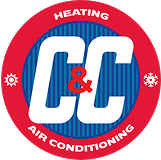If you’ve ever shopped for an air filter for your heating and cooling system, you’ve probably seen the terms MERV and HEPA. At first glance, these terms can be quite confusing and make it more difficult to determine what type of air filter you should buy for your HVAC system. For this reason, we’ve produced this handy guide to help you understand the differences and make it easier to find the right filter for your needs.
What Is a MERV Rating?
MERV (minimum efficiency reporting value) is a measurement scale that rates the efficiency of an air filter. This is done by testing the filter to see how effective it is at trapping airborne particles of various sizes. The scale specifically looks at four different measurements: particles larger than 10 microns in size, particles between 3 and 10 microns in size, particles between 1 and 3 microns and particles between .3 and 1 microns. Based on how the filter performs in each of these categories, it is given a MERV rating from 1 to 20.
As you might expect, the smaller the size of the particle, the more difficult it is to filter out. The lowest efficiency MERV 1 filters are only effective at filtering out some of the largest particles, whereas the highest-rated MERV 20 filters are effective at removing up to 99.9% of particles down to .3 microns in size or smaller.
MERV 1 to MERV 4
These lowest-rated filters are generally only effective at filtering out particles larger than 10 microns such as pollen, dust mites and textile fibers. The different MERV rating corresponds to how efficient the filter is at trapping these particles. In most cases, these filters are used for window air conditioning units, but you can also find MERV 4 filters designed for residential HVAC systems.
MERV 5 to MERV 8
These filters are effective at trapping some particles down to 3 microns in size, which includes things like lint, some paint fumes, cement dust, mold and other fungus spores. This type of filter offers better protection for residential and commercial HVAC systems.
MERV 9 to MERV 12
These filters can trap at least some particles down to 1 micron. This includes lead dust and some types of bacteria. This type of filter offers the best protection for residential systems and is also used for most public areas inside of hospitals and doctor’s offices.
MERV 13 to MERV 16
These filters can trap much smaller particles including most types of bacteria, smoke, auto fumes and pet dander. It is rare to find these filters used outside of certain commercial applications, inpatient hospital rooms and smoking lounges. The reason is that it requires a very powerful HVAC system to draw air through this type of filter without restricting the airflow.
Are MERV and HEPA the Same Thing?
HEPA (high-efficiency particulate air) filters are a special type of filter used in hospital operating rooms, ICU units and other areas that need to be extremely clean and sanitary. These filters are theoretically effective at filtering out up to 99.97% of all particles down to .3 microns. Although HEPA is its own separate category of filter, any filter with a MERV rating of 17 or higher is considered a HEPA filter. The only major difference is that the MERV scale is basically only used to rate HVAC air filters whereas HEPA can also be used to rate other types of filters.
In addition to hospitals, HEPA filters can be found on some vacuums as well as portable air purifiers. Both HEPA air purifiers and HEPA vacuums can be a huge help for people with allergies and respiratory issues. Although they can only clean the air in one room, a portable air filter can still help to minimize allergy symptoms by eliminating most pollen, dust mites, pet dander and other airborne allergens. Similarly, HEPA vacuums are great at allowing you to clean your floors without the risk of these particles being spread throughout the air.
Other Filter Rating Systems
The MERV system is the main industry standard when rating the efficiency of air filters. However, some manufacturers and retailers have their own rating systems. The two most common ones you might encounter are FPR (filter performance rating) and MPR (microparticle performance rating).
These two scales only measure sub-HEPA filters and work in a similar way to the MERV scale with the higher number indicating higher efficiency. The FPR scale assigns filters a rating between 4 and 10. An FPR 4 roughly corresponds to MERV 6, while an FPR 10 is the same as MERV 13.
The MPR scale only looks at how effective a filter is for particles between .3 and 1 microns. At the lower end of this scale is MPR 300, which is similar to FPR 4 or MERV 6. At the high end of the scale, you’ll find MPR 1300-1900 filters, which correspond to MERV 13.
What Filter Is Best for My HVAC System?
Using the right type of air filter for your HVAC system is essential. While the lowest-rated filters are always quite a bit cheaper, they also won’t be very effective at eliminating allergens and other airborne particles from your air. They will also be less effective at preventing these particles from getting into your HVAC system, which is the primary purpose of an air filter. As a result, they could increase the need for potentially expensive furnace or air conditioner repairs.
On the other hand, you can also harm your HVAC system and potentially decrease its lifespan if you attempt to use too efficient a filter. For most residential purposes, you should probably go with something between a MERV 6 and a MERV 12. Anything above this will restrict the airflow to your system, which will force it to work much harder to heat or cool your home.
In most cases, a MERV 6 or MERV 8 filter will be plenty sufficient for residential purposes. However, there are certain situations where you might want to consider upgrading to MERV 10 or 12. For instance, if you suffer from asthma, allergies, or other respiratory issues, a higher-rated filter can further minimize the amount of airborne allergens that could trigger or worsen your symptoms. Since they will also trap more dust and debris, these filters can also be a good choice for anyone who lives in an older home or anywhere that is especially dry or dusty.
HVAC Advice and Services You Can Trust
With more than 70 years of experience serving customers in Roseville and the greater Detroit area, C & C Heating and Air Conditioning has the knowledge and skills to handle any of your HVAC needs. Whether you’re in need of air conditioner installation, repair or maintenance during the summer or if you need your furnace worked on in the winter, our professional HVAC technicians are always ready to help. We also work on water heaters and ductless HVAC systems, and we offer several options to help improve your indoor air quality including air purification, dehumidifiers, duct cleaning, UV lights and more. Whatever your HVAC needs are, contact C & C Heating and Air Conditioning today to see what we can do for you.





